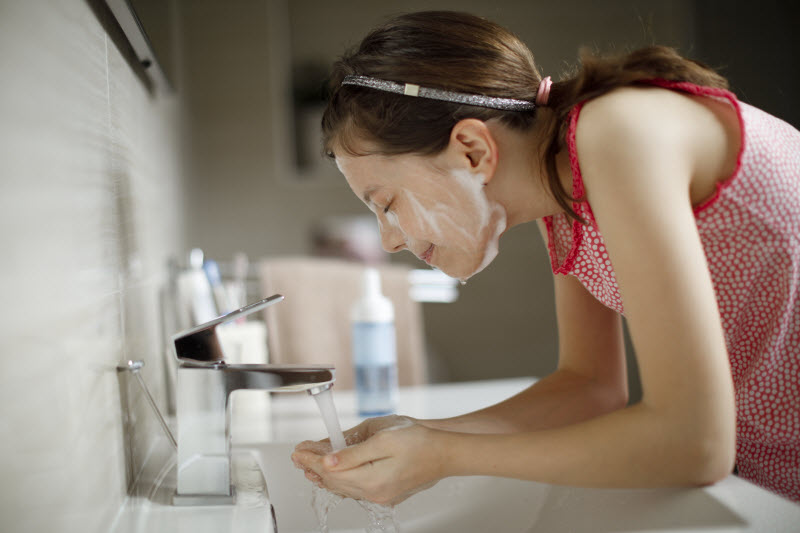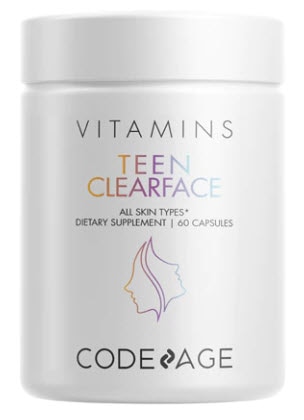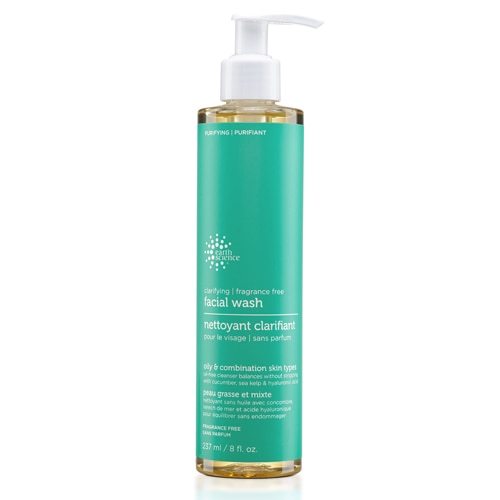The
teenage years are met with rapid change, including rushes of hormones, physically changing bodies and neurological adaptations. During these tumultuous years, teenagers usually branch out socially, experimenting with style, self-identity and physical appearance, and are beginning to date. Many teens find themselves more preoccupied with their appearance than they may have been during childhood.
For many teens, the rapid change in hormones can
lead to acne. In fact, 85% of male and female teens experience some level of acne, and half of those continue to deal with the condition into adulthood. Learn more about teenage acne and what you can do for clearer, healthy skin.

Teen acne is common, but emotionally challenging
Despite acne being incredibly common, it is often met with embarrassment.
Research shows that teens report a significant negative impact on their quality of life when dealing with acne.
Sadly, many teens report feeling dissatisfied with their appearance, shame, lower self-confidence, anxiety and worsening mental health. Although social changes should occur so teens feel less pressure to look a certain way, for those dealing with these emotional effects in real-time, having some solutions to help clear up acne and support healthy skin can go a long way toward helping them feel better about their appearance.
What causes teenage acne?
According to the
American Academy of Dermatology, several factors can contribute to developing acne. These include abnormally rapid shedding of skin cells known as follicular hyperkeratinization, colonization of the bacteria P.acnes, sebum production (natural oils), inflammation, hormones, diet and genetics.
Treating acne depends on the cause, but a single culprit isn’t always clear. Therefore, experts often recommend experimenting to see what works for each individual. While severe cases of acne require a dermatologist, who can take samples and try to narrow down the root cause, less severe cases can be treated and supported at home through dietary and other lifestyle changes.
Diet choices that may cause acne
Diet and metabolism play a role in the development of acne, but it may not be in the way you think. While there’s a common misconception that oily foods and chocolate cause acne, there’s not any proof of this.
Instead, it’s the
glycemic content and dairy foods that impact hormones such as insulin, insulin-like growth factor 1 and androgens. These hormones play a role in the development of acne. Foods with a high glycemic load, which spike your blood sugar, can lead to
overproduction of sebum, infection with acne-causing bacteria and resulting breakouts.
Dairy foods can also cause this effect in some people to a lesser degree. The impact of dairy on acne is likely due to the progesterone and testosterone precursor hormones found in dairy foods. Skim milk is especially associated with breakouts due to its high glycemic index.
Dietary nutrients that fight acne
Regarding nutrients that help prevent and treat acne,
research shows that omega-3 fatty acids, dietary fiber, antioxidants, vitamins A, C, D, E, and B, and the minerals zinc, iodine and selenium may be effective.
Omega-3 fatty acids are promising for treating and preventing acne breakouts. Plenty of research backs up the use of omega-3s for skin conditions of all sorts, and acne is no exception. One reason for this,
according to scientists, is the mediating effect omega-3s have on the inflammation and oxidative stress aspect of the acne process. Teens that consume a higher amount of omega-3 fatty acids tend to have significantly lower rates of all types of acne, including comedones, papules, pustules, acne cysts and oily skin.
Vitamin A is an excellent nutrient for combatting acne. This vitamin plays a role in forming new cells and speeds up their regeneration, boosting skin cell turnover for clearer skin. Vitamin C is also a skin-health powerhouse as it’s involved in wound healing and combatting inflammation that causes acne.
Vitamin D is vital for healthy, clear skin since it prevents acne lesions by inhibiting cell division and sebum production that causes breakouts. Vitamin D helps keep pores clear, so they don’t become blocked and inflamed and inhibits the growth of acne-causing bacteria. Research shows that supplementing with vitamin D has a powerful effect on reducing inflammatory acne. As well, those with acne tend to be lacking in enough vitamin D.
Another vitamin that helps keep your skin clear is
vitamin E. It is a potent antioxidant, anti-inflammatory and anti-seborrheic nutrient. Those low in this vitamin tend to have hyperkeratosis and dry skin, leading to acne breakouts.
Zinc and selenium are powerful acne fighters. Zinc inhibits the growth of acne-causing bacteria and also prevents inflammation. It’s an antioxidant and has anti-inflammatory properties. Research shows that people with acne tend to have significantly lower serum zinc concentrations. Selenium helps regulate sebum production, preventing it from overproducing and causing acne. It’s also an antioxidant and works well in combination with zinc and selenium to fight acne.
Other help for acne
Aside from topical treatments and dietary changes, managing your sleep and
stress is essential.
Getting enough physical activity can also contribute to clear skin as blood flow brings nutrients and decreases inflammation.
If you are concerned about acne you should see a dermatologist for their recommendations. Sometimes prescriptions are necessary to reduce acne and prevent scarring that can result.
Final thoughts
Dermatologists agree that no matter the cause or severity of acne, a
combination of therapies and treatments is best. Although topical antibacterial treatments can work, antibiotic resistance is risky, so using this method alone is not recommended. Supporting your skin with nutrients in food and supplements
helps reduce acne breakouts and may also allow other treatments to work better.
†These statements have not been approved by the Food and Drug Administration. These products are not intended to diagnose, treat, cure or prevent disease.
Featured Product






